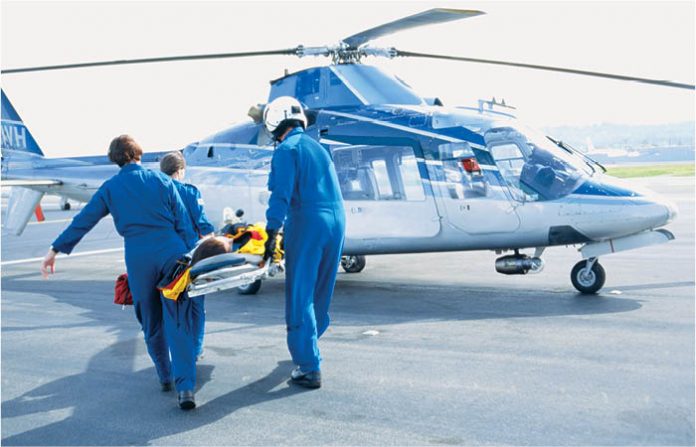Travel risk management is an established practice. In this two-part series, stakeholders of the corporate travel industry discuss elements of Duty of Care in India Ankita Saxena n the context of business travel, Duty of Care refers to the obligation of an organisation to take responsibility for the safety of its employees when they travel for work.Companies specialise in off ering various tools and an organised framework to manage corporate travel.
Ankita Saxena
WHAT IS DUTY OF CARE?
Duty of Care is defi ned as the corporate obligation that an employer has to secure the welfare of its employees, when the employees travel on offi cial work, explains Gaurav Sundaram, President, ProKonsul and Regional Director, GBTA. Tracing the genesis of this concept in business travel, he points out that the concept of Duty of Care emerged and became a major component of business travel polices worldwide post the incidents to 9/11. “In many parts of the world like USA, Canada, Europe and Australia, this is a legal statutory obligation of the Directors and the management of the company and there are many instances where the Board of Directors, Chief Executive and other offi cers of the company are legally and fi nancially liable for negligence, if proven. Th is is not yet a legal obligation in India which is why there is limited or nil CXO visibility or focus amongst most Indian companies.
This is however a very well established business practice with multinational and large Indian transnational fi rms,” he says. Resonating with the views of Sundaram, Rakshit Desai, Managing Director, FCM Travel Solutions, says, “Duty of Care basically is a corporate responsibility towards its employee. Historically, when employees travelled, they were pretty much on their own. But overtime, support system developed to assist various situations like medical evacuation to even hostage negotiation. Th is has moved on to a stage where corporates want real time information access and want to preempt some of these issues. So Duty of Care is fairly a broad term which means that I need to know where you are and what you are doing but equally I need to know where you will be and what you will be doing so that if there are any risks associated with it then I can manage that. It actually boils down to the employer caring about the well-being and safety of its employees.”
IS TRAVEL RISK MANAGEMENT DIFFERENT FROM DUTY OF CARE?
According to Greeley Koch, CEO, ACTE, Duty of Care is, effectively, the catalyst for travel risk management. Koch says, “Travel risk management is the overall strategy travel managers take to protect their travellers and business interests, from providing education to travellers on how to protect themselves while on the road to having contingency plans in place for accidents. In other words, duty of care requires travel managers to develop a comprehensive risk mitigation strategy.”
Discussing further, Rakesh Bansal, CEO, Amadeus India, deliberates that keeping employees safe is of utmost importance, and having a reliable travel risk management programme and Duty of Care policy in place is essential for any business. However, many in the travel community use ‘duty of care’ and ‘travel risk management’ interchangeably since they fall under the umbrella of safe employee travel. However, the two have distinct meanings. “While Duty of Care is a straightforward corporate liability with focus on well-being of travelling employees, Travel Risk Management entails an organised and professional plan with appropriate risk management approaches to ensure safety.
Travel Risk Management, by comparison, is comprehensive, constant, and ever-changing. One holds little or no meaning without the other,” explains Bansal. Elucidating the concept with examples, Rebecca Daniels, Sr Director Sales Management, Global Commercial Sales at Sabre APAC, says, “For example, if a business trip is planned to a highrisk country, Travel Risk Management would involve coordinating who flies on the same flight, hiring a security team on-site, or booking accommodation that has been previously vetted by a certified security team. Duty of Care can be considered as a sub-set of Travel Risk Management and is a programme that is enabled through tools and technology that allow information to be sent between the Travel Manager or Travel Management Company (TMC) and the traveller, allowing all parties to be informed of the latest situation that could have an impact on security.”
ASPECTS OF TRAVEL RISK MANAGEMENT
In Sundaram’s words, Travel Risk Management is a function of Duty of Care. He explains that some of the basic aspects of travel risk management include active advisory on potential travel risks and security related news; creation of robust policies and continuing training and sensitisation of employees; active intervention and approval by multiple levels of officers of the company in case an employee is travelling to a high risk destination; subscription to bulletins or round the clock news and alerts that update corporate travel administrators and travellers on security instances, general travel risk and security issues; active tracking of all corporate travel bookings made through the designated TMC including individual PNR tracking; subscribing to the services of global travel risk and security or medical services like iJET, ISOS, Anvil; ensuring that all reservations and hotel bookings made are done through approved official travel management service providers so all information is centrally updated and tracked; insuring travellers when they travel abroad is also a mandate that most companies implement. The other advanced aspects can include active counselling of the travellers with regards to the attendant risks and advise of how best to protect oneself; detailing security, GPS and mobile tracking or regular check-ins to a defined helpline number or email id.
WHERE DOES DUTY OF CARE FIT INTO TRAVEL MANAGEMENT?
According to Bansal, Duty of Care is a critical issue for all companies involved in travel, and it has become crucial to have travelling workforce feel safe, informed and supported. He says, “We believe that travel disruptions can happen at any time, from a minor incident such as a missed fl ight connection, right through to a natural disaster or man-made crisis. Regardless of the severity, such occurrences require an urgent response to ensure the health, safety and security of travellers at a moment’s notice.” In order to help companies meet their Duty of Care requirements, the company off ers Amadeus ‘Mobile Messenger’- a global, complete Duty of Care solution enabling employers to locate, communicate with and assist travelling employees. Bansal explains that the Amadeus Mobile Messenger not only enables companies to meet their legal and ethical responsibilities, but also ensures employees have an enhanced travelling experience by tracking employees’ location and updates traveller data in real time in addition to various other benefi ts. Additionally, companies and travel management companies are able to keep their employees well informed and provide fast and effi cient assistance when needed through Mobile Messenger. Daniels, further elaborates that Duty of Care is the responsibility of either corporate travel management teams, who may choose to include this as part of their planning, or of TMCs. In fact, duty of care has become the standard and primary reason why corporations work with TMCs to manage their travel programmes. “TMCs add value by providing their clients with technology, like tripcase and safepoint, which is fully integrated to the traveller experience, ensuring peace of mind. By taking on the Duty of Care component of a corporation, TMCs ensure that all risks are monitored, and that employees and managers alike are well-informed of any security risk while travelling on business and capable to respond accordingly. It enables the corporate travel manager to communicate with its employees on the road in an organised and effi cient manner,” she says.
Travel management companies like Carlson Wagonlit Travel (CWT) also support organisations with travel risk management. Vishal Sinha, CEO, India, Carlson Wagonlit Travel, points out, “Companies in India are increasingly looking for ways to minimise trip disruption and ensure the safety of their employees when incidents occur. One of the key elements of travel risk management is being able to track travellers.” He further elaborates that with many Indian companies expanding their operations nationwide and even overseas they’re going to have a lot more employees travelling for work. “When an incident takes place, we can quickly generate a report through our CWT AnalytIQs tool. Th rough the CWT To Go mobile App, we are able to update the impacted travellers on the situation, and any changes we make to their travel arrangements also appear on the App.”












